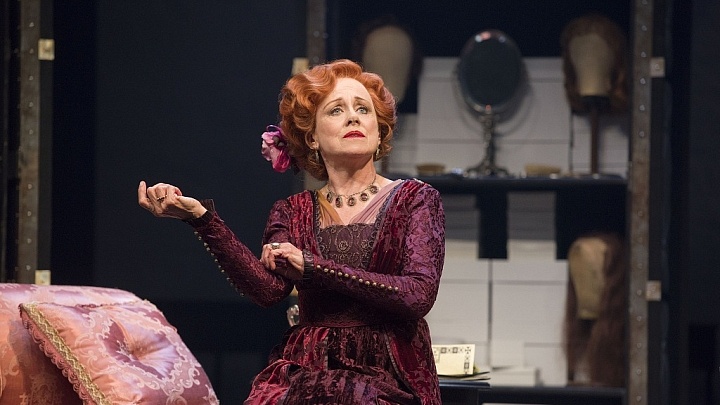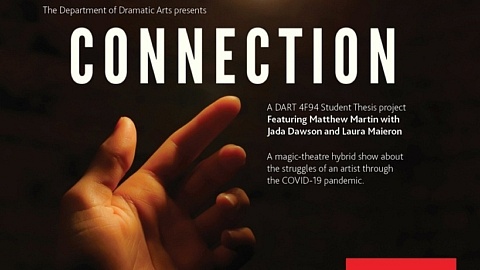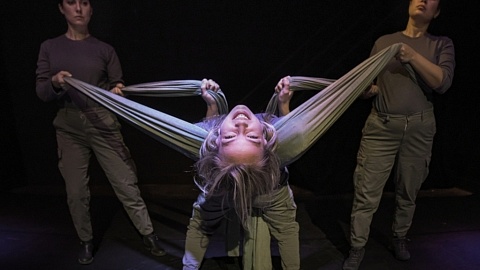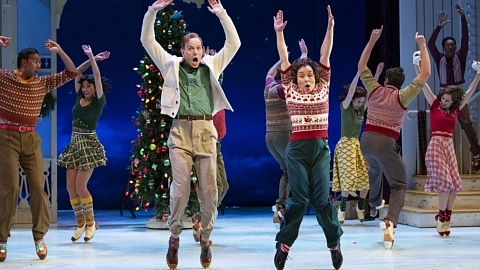“The magic of theatre” – a common descriptor of productions and a personal favourite explanation as to why I love the arts. Theatre has an ability to...
Gods Et Al: “The Divine” Demands To Be Seen
Not just for Sarah, for everyone; The Divine: A Play for Sarah Bernhardt is misleading in its title, but moving in its story. Written by Michel Marc Bouchard and developed by Jackie Maxwell for the Shaw Festival, Linda Gaboriau’s English translation of The Divine premieres this season at the Royal George Theatre.
Set in 1905 Québec City at the time of Bernhardt’s stormy tour to the predominantly Catholic area — especially notable for the actress’ comments on Canadian cultural retardation, claiming they were “still under the yoke of the clergy” — The Divine tells the story of the almost mythically famous actress’ politically tumultuous visit through the eyes of a wealthy and naive seminary student. With a flair for the dramatic and a penchant for the pensive, Michaud (Ben Sanders) befriends the troubled and enigmatic Talbot (Wade Bogart-O’Brien). Tasked with personally delivering the archbishop’s letter banning Bernhardt (Fiona Reid) from performing, Michaud takes the opportunity to strike up an unlikely friendship with the actress, his idol. Finding herself in need of artistic revitalization, Sarah is intrigued by the grit and gravity of Michaud’s play-in-progress — the inspiration being Michaud’s increasing fascination with the plights of the poor and the unspeakable darkness plaguing his new friend Talbot.
Anchored in the early 20th Century yet crushing in its immediacy, Maxwell’s production is a stunning paradox, poking fun at the conventions of theatre and its function as a soother for the social conscience of the bourgeoisie, while at the same time identifying exactly the potential art has to unconsciously effect change. The company delivers stirring performances, respectful of the heavy material, with class and courage: Sanders’ and Bogart-O’Brien’s portrayals of innocence both lost and won have the strength necessary to skirt a purely pitiful emotional outcome, Reid manages to capture just the right flavour of over-theatricality to bring the titular character’s commanding presence to fruition without being overwhelming, and, alternatively, Martin Happer as Brother Casgrain is delicately understated, playing a difficult role with immense dignity. There are no two-dimensional performances from this cast, with even seemingly lighter characters – Leo (Kyle Orzech), Mrs. Talbot (Mary Haney), and Madeleine Courteline (Darcy Gerhart) to name a few — offering many layers to be unpacked at the discretion of the spectator.
The complex story is complemented by a simple design by Michael Gianfrancesco, whose set is stark and appealing with clean lines and deep-reaching perspective. An original score by John Gzowski and tactful lighting by Bonnie Beecher create an environment that allows the story to come alive while keeping the audience firmly situated in the theatrical space.
Providing this fresh perspective on Bernhardt’s progressive beliefs about purposeful art, religious jurisdiction, and female capability, The Divine receives my strong recommendation. Talbot claims “theatre is just a bunch of stories made up to make rich people cry”. Whether or not he is right, this is one story that needs to be told.
Related Posts
Watching Glory Die is a call to action. Judith Thompson’s play is based on the true events surrounding the death of Ashley Smith, a teenage inmate at...
Sometimes, what you really need is to see grown adults dressed as turkeys dancing with pilgrims. It’s good for the soul. As is the rest of Holiday Inn – a...
Watching Glory Die is a call to action. Judith Thompson’s play is based on the true events surrounding the death of Ashley Smith, a teenage inmate at...
Sometimes, what you really need is to see grown adults dressed as turkeys dancing with pilgrims. It’s good for the soul. As is the rest of Holiday Inn – a...
Leave a Reply (Cancel Reply)
Twitter Feed
Blogroll
DARTcritics.com is partially funded by the Marilyn I. Walker School of Fine and Performing Arts, in support of student learning; experiential education; student professionalization; public engagement with the teaching, learning and production activities of the Department of Dramatic Arts; new ways of thinking; and the nurturing of links with our communities.





